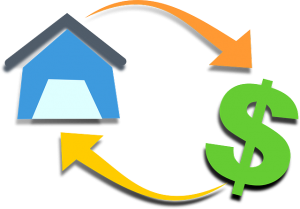Businesses hoping to expand or just to stay afloat, need to look at various financing sources
By: Hitesh Khan/
Though many business owners at some point tap into home equity as a financing source, you need to determine whether this strategy is right for you.
Those searching for financing sources should know the basic difference between the two primary kinds of home equity debt.
Table of Contents
A home equity loan is a one-time lump sum that is paid off over a particular amount of time with a fixed rate and number of payments. A home equity line of credit–also known as a HELOC–works more like a credit card because it has a revolving balance. Interest is due on the outstanding balance and that rate may vary over time.
As long as your home has appreciated in value, there will be a bank or mortgage broker who wants to loan you money in the form of either a home equity loan or line of credit right up to your credit limit. It’s in their best interest because they make more money that way. Yet just because you qualify for a home equity line doesn’t mean you need to use it, particularly as a bank for investment purposes.
When searching for financing sources, quite a few things need to go your way for you to use your home equity line effectively. While home equity loan interest rates may cost you less than borrowing from other sources, such as a bank or even from a brokerage account, you still need to be very careful and perform your due diligence.
To borrow home equity effectively, you need stable interest rates and rising home values. In other words, this strategy works best during a strong economy. It’s up to you and/or your team of advisors to determine the pulse of the local and national economy.
Even if you’re operating in a strong economic environment, many financial planners would tell you that if you need to borrow from home equity, you may not be in the strongest financial position to make an investment in the first place.
When searching for financing sources, here are the things you should discuss with a trusted financial advisor before tapping into your home equity:
- Will your investment deliver a greater after-tax return than you’ll be paying for the loan?
- Does your home equity loan or line carry an adjustable rate? If so, a jump in interest rates may make what you owe even more expensive and further offset any gains you make in your investment. If rates fall, it’s good news, but given current conditions, it makes sense to be cautious.
- How much is property appreciating each year in your neighborhood on average? Is it enough to further offset the cost of your investment? Keep in mind that no one is predicting the type of double-digit property appreciation we saw in the past.
- How will this loan work for you from a tax perspective? Keep in mind that interest on home equity loans is generally not tax-deductible if you aren’t using the debt to buy or renovate a property.
- What if you need your home equity borrowing power later for an emergency–the real reason most of us should open a home equity line and then avoid using it? Could you handle that emergency if your borrowing was strained to the maximum?
- How liquid is this investment? If you had a sudden major expense, could you turn it into cash without major hardship?
- How much other debt do you have? Do you have significant balances on credit card or auto debt? That may raise the rate you pay on your loan–another potential cut in your investment profit potential.
- From a cash flow perspective, will you be able to service the debt–make the loan payments–assuming your investment using the home-equity funds doesn’t work out?
Home equity is a good option as financing sources and lets you borrow money, while using your house as collateral. Home equity loan is another option available to homeowners who may have a tight cash situation but have have a valuable house at their disposal, which they may sell and downgrade. But a home equity loan lets you get money out of your house, without having to lose it.
 There are plenty of advantages: when your house is the collateral, the bank feels a lot more secure; they know you can’t exactly pack up your house and run away with it. Because there’s something they can foreclose on, banks consider home equity loans to be low-risk, secured loans. That means they charge a super-low interest rate, seldom above 1.3 per cent per annum. For reference, that’s less than a third of your CPF Ordinary Account rate (up to 3.5 per cent per annum), and about 1/6th of a personal loan rate (about six per cent per annum).
There are plenty of advantages: when your house is the collateral, the bank feels a lot more secure; they know you can’t exactly pack up your house and run away with it. Because there’s something they can foreclose on, banks consider home equity loans to be low-risk, secured loans. That means they charge a super-low interest rate, seldom above 1.3 per cent per annum. For reference, that’s less than a third of your CPF Ordinary Account rate (up to 3.5 per cent per annum), and about 1/6th of a personal loan rate (about six per cent per annum).
That super-low interest rate means home equity loans are quite cheap, and can provide a much bigger loan than you’d get through, say, a personal installment loan. Most other, unsecured loans can only lend you up to four times your monthly salary.
On top of this, the government in 2017, made regulatory changes to home equity loan restrictions. If your house is already paid up, you can borrow up to half its value, without having to meet Total Debt Servicing Ratio (TDSR) restrictions.
Sadly though, home equity loans can only be gotten for private a private property.
HDB rules say, “HDB flats can only be mortgaged to banks or financial institutions to finance the purchase of the flat itself. You are not allowed to use your HDB flat, which has been fully paid for, as collateral to banks to raise credit facilities for private reasons.“






